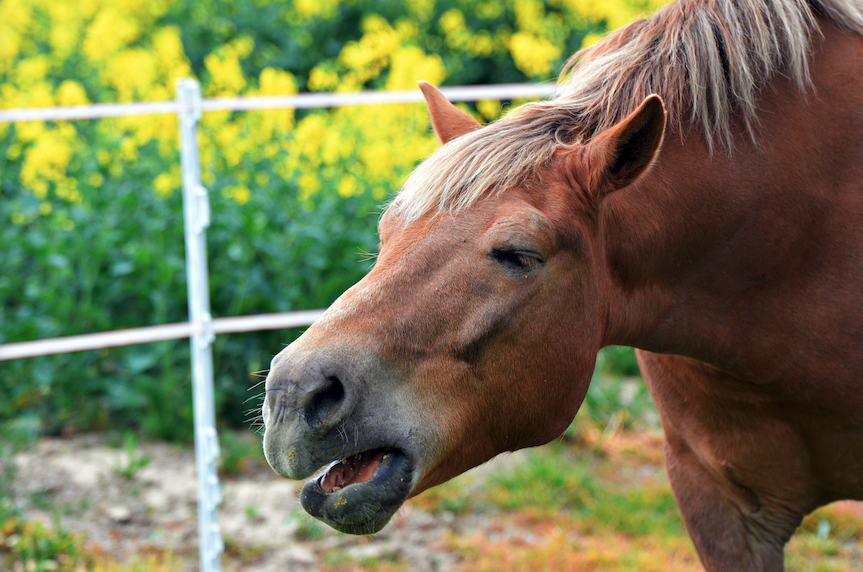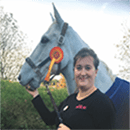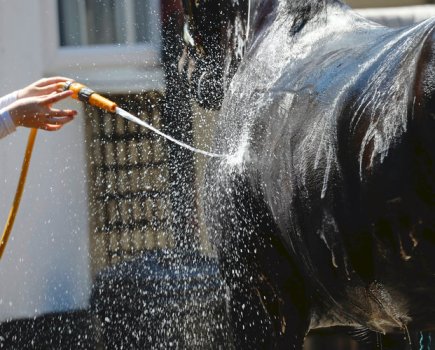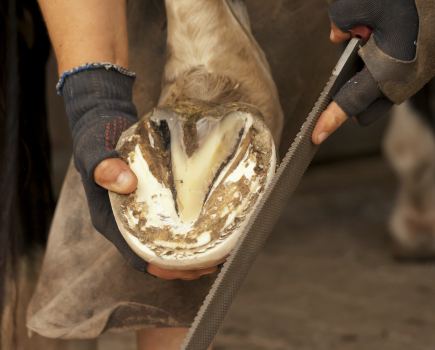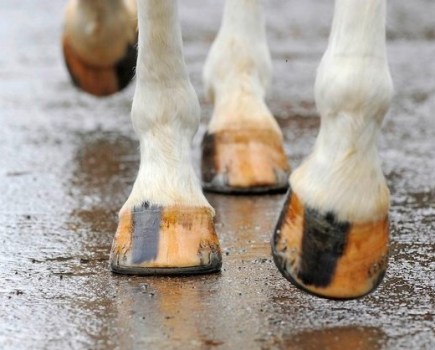When trying to find the answer to ‘Why is my horse coughing?’, first you must identify which of the following three categories the cough falls into:
- Environmental coughs are caused by spores from bedding, dusty or mouldy hay, or from a lack of clean air.
- Bacterial infection coughs can occur when these spores have settled in the airways.
- Viral coughs are often airborne, or spread by snot or phlegm.
In all cases, a cough develops along the horse’s larynx, which is sometimes known as the voice box. This is the structure that connects the nasal passage to the horse’s windpipe in the upper respiratory tract.
When coughing is a concern
Coughing is always a concern as it could be a sign that something more serious is affecting the horse’s health. This trigger may or may not be covered by any horse health insurance policy you have in place.
If the coughing only occurs when the horse starts exercise, and then disappears after a couple of minutes, the cause is likely to be environmental. However, if the coughing persists it usually signals the presence of an infection.
Lucinda Ticehurst, an equine vet, point-to-point jockey and side-saddle rider based in Northamptonshire, believes that every horse owner and rider should have a good understanding of the horse’s respiratory system.
“Horses are adapted to hide respiratory issues, as not doing so would make them vulnerable to predators in the wild,” she says.
“This means, though, that it is vital to remain diligent in detecting a weakness before it progresses to something more serious with long-term effects.”
The equine respiratory system
Lucinda explains that horses are obligate nasal breathers, which means they breathe through their nose — horses cannot breathe through their mouth like we do — and signs of respiratory stress can be subtle.
“The primary function of the horse’s respiratory system is the exchange of oxygen for carbon dioxide that takes place between the millions of tiny air sacs called alveoli and the pulmonary capillaries that envelop them,” adds Lucinda, who set up LT Equine Veterinary Services in 2020.
“This allows the horse to obtain oxygen for energy production and removes carbon dioxide, a waste product. The respiratory system also helps to regulate the horse’s body temperature by adjusting the rate and depth of breathing.”
Upper respiratory tract
- Nostrils – the entry point for air
- Nasal passage – these are lined with mucus membranes that help to filter, warm and humidify the incoming air, removing dust and foreign particles and protecting the lower airways.
- Pharynx (throat) – the epiglottis, a flap-like structure, covers the trachea (windpipe) during swallowing to prevent food and water from entering the lower respiratory tract.
- Larynx (voice box) – located at the top of the trachea, the larynx contains vocal cords and plays a role in regulating airflow during respiration.
Lower respiratory tract
- Trachea (windpipe) – a rigid tube composed of cartilage rings that provide structural support. The windpipe connects the larynx to the bronchi and conducts air from the upper respiratory tract into the lower.
- Bronchi and bronchioles – the trachea divides into two bronchi, each leading to one lung. These bronchi then branch into smaller bronchioles, allowing air to reach the deeper lung tissue.
- Alveoli – these are the smallest air sacs in the lungs and the primary sites of gas exchange. Oxygen from the inhaled air diffuses into the bloodstream, which carbon dioxide from the blood is expelled into the alveoli to be exhaled.
Why is my horse coughing?
Along the larynx are a series of receptors. It’s when these receptors are stimulated by spores, such as dust, pollen or mould, that coughs are kick-started into action.
“When the receptors are stimulated, the larynx will trap the air to try and prevent it going further down the respiratory tract,” explains equine vet Dr Keesjan Cornelisse from Calweton Veterinary Group in Cornwall.
“This will open to expel the air to get rid of the foreign material, which is how your horse coughs. Each horse has different tolerance levels. Some are more sensitive to dust and dirt than others.”
A common cause of coughing in horses is equine asthma or respiratory disease — chronic obstructive pulmonary disease (COPD) or recurrent airway obstruction (RAO).
If it’s an infection, it can be spread through coughing or sneezing when animals are sharing air space, especially if there’s not enough air turnover.
Low temperatures cause horses’ expirations to form very small droplets, which can find their way deep into the lungs.
Larger droplets found in warmer weather can be filtered by the membranes within a horse’s nose and head.
Phlegm or snot produced by an affected horse can spread infections, and viruses such as influenza can also be spread this way.
Environmental causes
An environmental cough is a result of your horse trying to get rid of whatever spore or dust particle has entered their respiratory tract.
“Bacterial particles such as mould and dust from bedding or pollen spores stimulate the sensitive receptor nerves and irritate them. If the bacteria isn’t dislodged, then an infection develops,” says Dr Cornelisse.
An environmental cough will sound raspy and dry, and can be occasional or repetitive. Your horse usually won’t show any other symptoms, other than a clear or whitish discharge coming out from their nostrils.
Bedding
A common cause of an environmental cough is the inhalation of dust and mould from your horse’s bedding and within their stable. You’ll need to experiment with your horse’s stable environment to try and make it as dust-free as possible. Try:
- Turning your horse out to reduce their exposure to dust spores.
- Opening any stable windows to improve air circulation.
- Considering which bedding you use; look for a dust-free one.
- Giving stable walls a good sweep and clean to prevent dust build up and remove cobwebs, which collect dust.
It’s also worth assessing the quality of your horse’s hay. Soaking it can help reduce its dust and mould particles. Other options are steaming hay or feeding haylage if suitable for your horse.
Pollen
Seasonal changes in your horse’s environment which cause coughing can be harder to control.
“Pollen can become trapped in the hairs of your horse’s nose as they inhale. If they have a pollen allergy, these particles can inflame the airway lining and overstimulate the airway nerve receptors,” explains Dr Cornelisse.
“Consequently, your horse may cough, be wheezy and have breathing problems. They may also have watery eyes or head shake.”
Identifying the pollen your horse is sensitive to can prevent the problem.
“It’s worth alerting your vet to see if the pollen sensitivity can be stopped with steroids when the crop appears.”
If your horse’s cough produces a lot of mucus and/or if coloured discharge appears around the nostrils, speak to your vet.
In the event of an infection setting in, they’re likely to prescribe drugs to clear the mucus. But do note that drugs won’t fix the problem if your horse’s environment is the cause.
Bacterial infections
A horse coughing can be caused by bacterial infections when bacteria settles in the lower respiratory tract.
Pneumonia is a classic case of how a bacterial or fungal substance can develop into an infection in the lower respiratory tract.
Bacterial infections often come hand in hand with mucus, because the mucus pushes the dirt out of the airway.
“This mucus will start to develop from that inflammation, three to four days from when the particle first enters the horse’s system so take a look at the colour of the discharge from their nostrils,” advises Dr Cornelisse.
Look for:
- Clear or white discharge, which is normally harmless.
- Yellow or green discharge, which suggests an additional infection and you need to call your vet.
Your vet will advise you to rest your horse as increased airflow in the airway causes the mucus to dry out, making it harder to clean.
“For most bacterial infections, your vet will prescribe your horse antibiotics to stop bacteria settling in the damaged tissue,” adds Dr Cornelisse.
“An easy way to prevent this type of infection is to stop the bacteria entering the system in the first place.
Viruses
Several viruses can cause airway inflammation, infection and coughing in horses. Most common are rhinovirus and herpes virus type 1 or 4, while equine influenza (horse flu) is seen less.
“These diseases are easily spread when horses are sharing and breathing in the same air. Controlling a viral outbreak can be difficult if your horse has no antibodies (immunity) to the virus,” says Dr Cornelisse.
A key sign of a viral cough is if the other horses on your yard are displaying similar symptoms.
“It varies from viral infection, but the cough may be rather dry and frequent and your horse will have a host of other symptoms, such as an increased temperature and a loss of appetite.”
If your vet diagnoses a viral cough, you’ll need to isolate your horse immediately.
“With cases of influenza or herpes virus your horse can be vaccinated and keeping these vaccinations up to date is vital if you want to limit the spread of the disease and keep your horse safe,” states Dr Cornelisse.
Exercise-induced coughing
Sometimes coughing occurs only when the horse is ridden. This is referred to as a ‘warm-up cough’.
It is essentially a build-up of mucus from environmental causes, such as dust, that need to be cleared from the respiratory tract.
“As the horse’s heart rate goes up, they’ll start to breathe deeper, and they will need their airways clear to maximise lung use,” explains Dr Cornelisse.
“A horse starts coughing when exercising to expel any mucus that’s accumulated, so the cough will sound wet rather than dry or raspy. However, some arenas are dustier than others, so the cough could be a result of that.”
Your horse should only cough once or twice at the beginning of exercise. If it’s more than that, it could be more serious, like an inflammatory airway disease (sometimes found in younger horses), which makes exercising difficult.
For a cough that is environmental, it should settle down as your hose progresses through the session. If not, then have them checked by a vet.
Nasal discharge
A horse who appears depressed, is off their food or has a high temperature may well have a respiratory infection, even if you haven’t noticed the horse coughing.
If you find phlegm outside their door or on the floor of the stable it’s likely they have a productive cough as the result of an infection within the lungs.
Nasal discharge can be the sign of a problem. Here’s what’s normal and what’s not:
- Clear or white discharge: Don’t worry just keep an eye on the horse’s breathing.
- Yellow discharge out of both nostrils: This could be anything from an allergy to strangles, it depends on the rest of your horse’s symptoms. If your horse is under the weather, call your vet.
- Yellow discharge out of one nostril: Usually a sinus infection or tooth abscess, call your vet.
- Green discharge: A rather advanced infection probably from somewhere in the respiratory tract.
5 ways to prevent a horse coughing:
- Only use dust-free bedding and soak or steam hay.
- Turn them out as much as possible — air quality is better in the field.
- Make sure there’s good ventilation: keep vents and windows open at all times. If stabled in a barn, avoid closing the main barn door.
- Don’t muck out or sweep around your horse.
- Feed from the floor. It’s better for their health and helps any mucus drain.
Main image © Shutterstock

